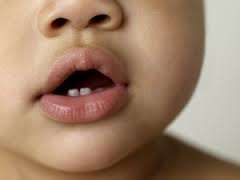What You Need to Know About Teething

While teething is a notable milestone in your child's development and an occasion for joy, it can also be an uncomfortable process for your little one.
The majority of babies begin teething between the ages of 4 and 7 months old, but some can begin as early as at 10 weeks or as late as 12 months old.
The teething process could take up to 3 years to be completed, by which time your child should have a full set of 20 pearly whites, but it's important to note that different babies follow different growth patterns and schedules.
Celebrate your baby's first tooth by taking lots of pictures for his or her baby book. If by the end of the first year you still don't see any sign of a tooth, bring the matter up with your pediatrician.
The Signs:
- Drooling & Facial Rash – Teething stimulates drooling, which is generally harmless but can lead to the development of a skin rash around the mouth and on the chin due to the skin's constant contact with saliva. To avoid this, gently pat away the drool periodically during the day and keep the patch of dry skin well moisturized with mild skin cream. Have your doctor recommend which type of cream to use.
- Gum Swelling & Refusing Food – Understandably, your baby's gums will be swollen and tender during the teething process, causing the baby some discomfort and pain particularly when feeding. Give your baby cold foods like applesauce or yogurt to help soothe the gums and keep your baby well fed.
- Biting – Babies will try to bite anything they can reach, from the fingers of unsuspecting friends and relatives to any toy or object within site, in order to relieve teething pain by applying counter-pressure. To spare yourself and your baby some grief, try giving him or her a teething ring or a wet washcloth that has been cooled in the fridge to chew on. You could also use a clean finger to gently massage your baby's gums, which will help relieve the ache.
- Sleeping Problems & Irritability – Your baby will begin to experience constant pain when a tooth rises closer to the surface of the gum, causing crankiness and wakefulness at night. Your doctor can prescribe a children's pain relief gel that you can rub onto your baby's gum to solve this, but be careful: rubbing on too much of the gel can numb the back of your baby's throat, which will weaken the gag reflex that protects it from choking on saliva. Make sure you follow your doctor's instructions before using the gel.
- Mild Fever & Diarrhea – Most doctors are reluctant to attribute diarrhea and fever to teething, but these two symptoms are not unusual when children begin to teethe. If your child does exhibit these symptoms, call your doctor and schedule an appointment for a proper checkup just to be on the safe side.
Note:
Never hesitate to talk to your doctor if your baby's symptoms worry you, as there may be other underlying causes for your baby's discomfort aside from teething. If at any point you feel that your child seems to be in unusual pain, call your doctor immediately; teething should not be an excruciating process.
Source: www.finebabyworld.com






